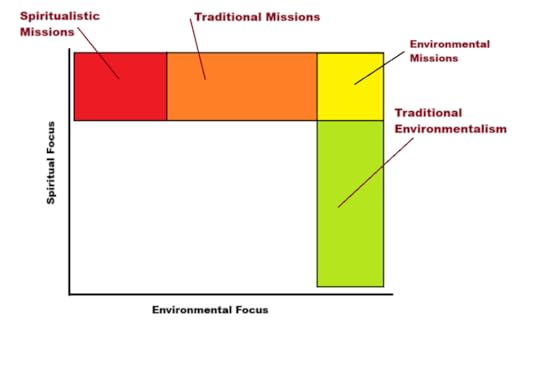Environmental Missions— Some Initial Thoughts
I have been reading “Environmental Missions: Planting Churches AND Trees” by Lowell Bliss. I have finished 5 chapters. I have 8 more to go, not including Epilogue and Appendices. Still I have some thoughts.
I thing very obvious is that Lowell Bliss knows his audience. He is writing to Evangelical Christians, and with perhaps an additional narrower focus— those in the Evangelical Missions community. He makes clear his credentials as a “traditional” Evangelical church planting missionary. He notes his traditional Evangelical training. He quotes from respected evangelical sources— especially Evangelical missiologists and Evangelical missiological congresses. He acknowledges Evangelical attitudes about the environmentalist movement, and seeks to address them. I almost said “American” Evangelical attitudes. However, it has spread to other parts of the world. For example, in recent years there have been strong disagreements as to whether mining should be outlawed in parts of the Cordillera mountains where I live. A number of Christian groups such as UCCP and the Episcopalians (along with some of those who hold to traditional local religion) generally oppose mining. The Evangelicals tend to want it to expand. Their argument tends to be— more mining means more money which means more good. He even talked about the various names he could use for this sort of integral/holistic missions, based in part on how Evangelicals would react.
But Bliss does not stop there. He next goes into a Biblical/Theological look at the topic. As one who trains pastoral/Christian counselors I have learned this all too well. You can talk about what works. You can talk about what is good. You can talk about church history. You can talk about a lot of things, but Evangelicals will always ask “But is it Biblical.” I have no problem with this… since I am an Evangelical myself (although the politicization of the term in the American context is starting to make me wonder when I should shed the label). But all too often when Evangelicals ask “Is it Biblical,” they are too often satisfied when someone says, “Yes it is… look at this verse I have ripped out of its context and its broader Scriptural, Historical, and Cultural setting.” Bliss, however, is using Old Testament and New Testament passages to build a Theology of Creation and then from there to a Theology of Environmental Missions. I have a lot of respect for the effort.
So far, I have only gotten as far as the OT basis for a Theology of Creation. I am looking forward to where it goes from there.
As I was reading, I thought about the different attitudes that missionaries have regarding the environment or environmental ministry. I love diagrams, so I used one I used before in my book on Theology of Missions (The Book is Here). Here is the modified version.

So in ministry, there an be a “spiritual focus.” When I talk about spiritual focus (and I admit I am using the term “spiritual” in a way I don’t care for) I am referring to types of ministries that get lumped together as distinctly Christian in nature— evangelizing, church planting, discipleship, prayer, worship, and so forth. Environmental focus can be a wide range of works regarding Creation Care, Environmental factors relating to health, sustainable fishing, agriculture, and so forth. Others can come up with a better list.
Where do ministries or missions fit into this. One area, I colored RED. I called this “Spiritualistic Missions.” With this perspective… missions is all about “Spiritual ministries” For such people— they are likely not to consider environmental work to be Christian ministry or missions. In fact, environmental work may actually be an impediment or a distraction.
The GREEN area an be labeled “Traditional Environmentalism.” Many in this category may not see themselves as Christians, or if they do, do not see their work in Christian terms. Some may see a spiritual component to what they do… but may not fit into a form of spirituality that most Evangelical Christians would identify as… Christian.
The ORANGE area I might call “Traditional Missions.” Consider someone like William Carey or Robert Moffat. They were actively involved in environmental or agricultural concerns. But to what extent do they see this work as being missions in the same way as preaching, evangelizing, and church planting? It is not necessarily certain. Now I do think that this category may be broken into two groups. Group A might be described as those who think that environmental focus may be valuable or good… but not necessarily “real ministry,” or they may seen it as a lesser good ministry. Group B are those who see their environmental work as a means to spiritual ends. This is known as the “Ulterior Motives” group. Environmental work is important if (and only if) it opens doors to spiritual opportunities or outcomes.
The final group is the YELLOW area. This could be called “Environmental Missions.” This is what Bliss called it. The Great Commandment is expressed both in the Great Commissions, and the Creation Command. When one does both (as opposed to one versus the other) and values both (especially when they are integrated together) one is fitting into this category.
Anyway, I have more to read. I don’t think I will every be an Environmental Missionary. But I think that (so far) Lowell Bliss is making a good care for its importance and value.



